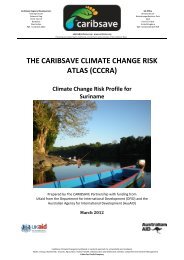Create successful ePaper yourself
Turn your PDF publications into a flip-book with our unique Google optimized e-Paper software.
Provide gender disaggregated data <strong>and</strong> evidence on the impacts of climate change to show<br />
how men <strong>and</strong> women are being affected differently by climate-related changes. This could be<br />
done for direct impacts, such as extreme weather conditions or disasters, water shortages,<br />
food insecurity or changes in l<strong>and</strong> use. This could also be done for indirect secondary impacts,<br />
such as access to energy, changes in employment opportunities, sectoral impacts (e.g.<br />
agriculture, tourism <strong>and</strong> fisheries), <strong>and</strong> increased migration or conflict.<br />
Conduct a gender analysis on the social impacts of current policies on adaptation <strong>and</strong><br />
mitigation <strong>and</strong> how they may benefit or adversely affect men <strong>and</strong> women in different ways.<br />
Even when policies have clear gender-related statements or objectives, rarely do they have the<br />
mechanisms in place to integrate gender at a programme level or to measure the impact of the<br />
policies from a gendered perspective. Economic cost-benefit analyses often overlook the social<br />
implications <strong>and</strong> there is a lack of methodology for measuring the gendered impacts of current<br />
policies.<br />
Improve institutional capacity in key agencies to implement gender sensitive policy or gather<br />
gendered data. This is needed due to the lack of gender experts involved in policy design <strong>and</strong><br />
implementation around climate change; the lack of awareness or gender training of key staff in<br />
ministries <strong>and</strong> statistics offices responsible for climate change data <strong>and</strong> policies; <strong>and</strong> a general<br />
disconnect between the reality of poor people’s (<strong>and</strong> particularly under-represented women’s)<br />
lives <strong>and</strong> policy makers.<br />
6.1.3. Information Sharing, Communication <strong>and</strong> Networking<br />
It is essential that a tri-partite approach is taken when developing the full action plans for the<br />
recommended strategies given. A number of relevant studies have been undertaken in the <strong>Turks</strong> <strong>and</strong> <strong>Caicos</strong><br />
Isl<strong>and</strong>s in the past, but the recommendations are frequently not implemented for a number of reasons, lack<br />
of resources being commonly cited. By establishing a framework by which government, private sector<br />
entities <strong>and</strong> civil society can work more effectively together, the probability of implementation <strong>and</strong><br />
widespread ‘buy-in’ to the numerous initiatives increases. It is not possible for any one group to achieve the<br />
changes that are needed alone <strong>and</strong> government must ensure that national policy goals <strong>and</strong> challenges<br />
faced are shared so that solutions can be discussed <strong>and</strong> negotiated between groups. Gaining support for<br />
initiatives is also facilitated through education <strong>and</strong> awareness, Section 6.1.4.<br />
The data <strong>and</strong> information produced through the various initiatives described in Section 6.1.1 must be<br />
communicated <strong>and</strong> made available through networks in each sector <strong>and</strong> across sectors. This is especially<br />
true for the idea of a green economy that will require the restructuring of economic systems towards<br />
establishing a low-carbon society, Section 6.3. It is thus important to document <strong>and</strong> communicate progress<br />
to create positive opinion in large parts of society.<br />
National level data should be made available to regional clearing houses where they exist <strong>and</strong>, where they<br />
don’t exist, thought should be given to establishing them. An area that could benefit from such a data<br />
repository is health. In particular, information on diseases whose transmission is modified by climate<br />
change as well relevant environmental data (Moreno, 2006), which would require input from health,<br />
environment <strong>and</strong> meteorological departments.<br />
169





